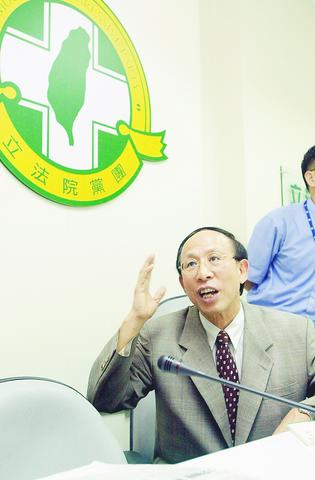The DPP yesterday sought to downplay President Chen Shui-bian's (陳水扁) call on Saturday for a referendum on the nation's future, saying that Chen's comments had been "over-interpreted" by the media.
"The referendum would be to defend the current status of Taiwan, not to change its current status. Unfortunately, [Chen's comments] were widely misinterpreted as calling for a change to the current status," DPP Secretary-General Chang Chun-hsiung (張俊雄) said at a press conference yesterday evening.
Chen told a Tokyo meeting of the World Federation of Taiwanese Associations via satellite video broadcast that there is "one country on either side" (of the Taiwan Strait) and that the nation should seriously consider passing referendum legislation so that a vote on Taiwan's future could be held.

PHOTO: GEORGE TSORNG, TAIPEI TIMES
DPP legislative whip Wang Tuoh (
"Many international media organizations interpreted President Chen's remarks as heading toward a path of independence, but I think they were over-interpreted," he said.
Chen's comments were widely considered his toughest to date on cross-strait affairs.
As to the issue of referendum legislation, Wang cautioned that the matter is highly contentious.
"Referendum legislation is a controversial issue between political parties and its implementation might lead to the unsteadiness of Taiwan's politics. I would remind my colleagues of the risks we would be undertaking if they propose the idea to the Legislative Yuan," Wang said.
Executive Director of the DPP's Policy Research and Coordinating Committee Lin Cho-shui (
"Beijing has said that it would separate economic issues from political ones and that it would attempt to discuss insensitive issues before sensitive ones. But it hasn't done anything to implement such ideas over the past two years," Lin said.
"After Beijing's series of provocative actions, it's about time for us to be tough on Beijing. We have to make Beijing understand reality clearly and not to have any unpractical expectations of Taiwan," he said.
Some academics, however, worried Chen might have gone too far this time.
"President Chen created a lot of space for cross-strait relations with his `five no's' policy. The new remarks, however, show his bottom line. What else can Chen say to scare Beijing next time?" said Wu Yu-shan (

Right-wing political scientist Laura Fernandez on Sunday won Costa Rica’s presidential election by a landslide, after promising to crack down on rising violence linked to the cocaine trade. Fernandez’s nearest rival, economist Alvaro Ramos, conceded defeat as results showed the ruling party far exceeding the threshold of 40 percent needed to avoid a runoff. With 94 percent of polling stations counted, the political heir of outgoing Costa Rican President Rodrigo Chaves had captured 48.3 percent of the vote compared with Ramos’ 33.4 percent, the Supreme Electoral Tribunal said. As soon as the first results were announced, members of Fernandez’s Sovereign People’s Party

EMERGING FIELDS: The Chinese president said that the two countries would explore cooperation in green technology, the digital economy and artificial intelligence Chinese President Xi Jinping (習近平) yesterday called for an “equal and orderly multipolar world” in the face of “unilateral bullying,” in an apparent jab at the US. Xi was speaking during talks in Beijing with Uruguayan President Yamandu Orsi, the first South American leader to visit China since US special forces captured then-Venezuelan president Nicolas Maduro last month — an operation that Beijing condemned as a violation of sovereignty. Orsi follows a slew of leaders to have visited China seeking to boost ties with the world’s second-largest economy to hedge against US President Donald Trump’s increasingly unpredictable administration. “The international situation is fraught

MORE RESPONSIBILITY: Draftees would be expected to fight alongside professional soldiers, likely requiring the transformation of some training brigades into combat units The armed forces are to start incorporating new conscripts into combined arms brigades this year to enhance combat readiness, the Executive Yuan’s latest policy report said. The new policy would affect Taiwanese men entering the military for their compulsory service, which was extended to one year under reforms by then-president Tsai Ing-wen (蔡英文) in 2022. The conscripts would be trained to operate machine guns, uncrewed aerial vehicles, anti-tank guided missile launchers and Stinger air defense systems, the report said, adding that the basic training would be lengthened to eight weeks. After basic training, conscripts would be sorted into infantry battalions that would take

GROWING AMBITIONS: The scale and tempo of the operations show that the Strait has become the core theater for China to expand its security interests, the report said Chinese military aircraft incursions around Taiwan have surged nearly 15-fold over the past five years, according to a report released yesterday by the Democratic Progressive Party’s (DPP) Department of China Affairs. Sorties in the Taiwan Strait were previously irregular, totaling 380 in 2020, but have since evolved into routine operations, the report showed. “This demonstrates that the Taiwan Strait has become both the starting point and testing ground for Beijing’s expansionist ambitions,” it said. Driven by military expansionism, China is systematically pursuing actions aimed at altering the regional “status quo,” the department said, adding that Taiwan represents the most critical link in China’s